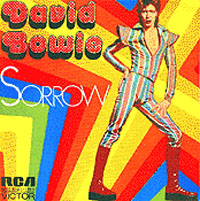The Merseybeats are an English band that emerged from the Liverpool Merseybeat scene in the early 1960s, performing at the Cavern Club along with the Beatles, Gerry and the Pacemakers, and other similar artists.
William Ellis Kinsley is an English musician, who was lead vocalist and bassist with The Merseybeats until 1966. The group disbanded in January 1966 to resurface as a duo called The Merseys. They recorded The McCoys' song "Sorrow" with the band before embarking on a solo career, where he recorded "Bye Bye Baby", a typical Merseybeat tune, followed by the singles "Annabella", and "You Make My Day".

Pin Ups is the seventh studio album by the English musician David Bowie, released on 19 October 1973 through RCA Records. Devised as a "stop-gap" album to appease his record label, it is a covers album, featuring glam rock and proto-punk versions of songs by 1960s bands who were influential to Bowie as a teenager, including the Pretty Things, the Who, the Yardbirds and Pink Floyd.

"Rebel Rebel" is a song by the English singer-songwriter David Bowie. It was released in the UK on 15 February 1974 by RCA Records as the lead single from the album Diamond Dogs. Written and produced by Bowie, the song is based around a distinctive guitar riff reminiscent of the Rolling Stones. Cited as his most-covered track, "Rebel Rebel" has been described as Bowie's farewell to the glam rock movement that he had helped initiate, as well as being a proto-punk track. Two versions of the song were recorded: the well-known UK single release and the shorter US single release, which featured added background vocals, extra percussion and a new arrangement.
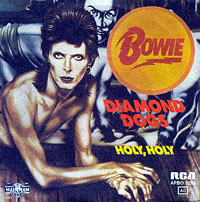
"Diamond Dogs" is a 1974 single by English singer-songwriter David Bowie, the title track of the album of the same name.
"Across the Universe" is a song by the English rock band the Beatles. It was written by John Lennon and credited to Lennon–McCartney. The song first appeared on the 1969 various artists' charity compilation album No One's Gonna Change Our World and later, in a different form, on their 1970 album Let It Be, the group's final released studio album. The original version featured on two different albums both titled Rarities: a 1978 British release and a 1980 US release. It was also included on their 1988 album Past Masters, Volume Two. The song has been covered by many artists, including David Bowie on his 1975 album Young Americans, which featured contributions from Lennon.

"Dancing in the Street" is a song written by Marvin Gaye, William Stevenson, and Ivy Jo Hunter. It first became popular in 1964 when recorded by Martha and the Vandellas whose version reached No. 2 on the Billboard Hot 100 chart for two weeks, behind "Do Wah Diddy Diddy" by Manfred Mann and it also peaked at No. 4 on the UK Singles Chart following a rerelease in 1969. It is one of Motown's signature songs and is the group's premier signature song.
"The Man Who Sold the World" is a song by the English singer-songwriter David Bowie. The title track of Bowie's third studio album, it was released in November 1970 in the US and in April 1971 in the UK by Mercury Records. Produced by Tony Visconti, it was recorded at Trident and Advision Studios in London in May 1970, towards the end of the album's sessions; Bowie recorded his vocal on the final day of mixing for the album, reflecting his generally dismissive attitude during the sessions. Musically, it is based around a "circular" guitar riff from Mick Ronson. Its lyrics are cryptic and evocative, being inspired by numerous poems including the 1899 "Antigonish" by William Hughes Mearns. Bowie's vocals are heavily "phased" throughout and have been described as "haunting".
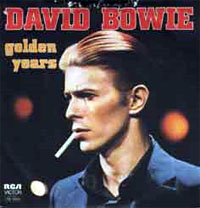
"Golden Years" is a song by the English musician David Bowie, released by RCA Records on 21 November 1975 as the lead single from his tenth studio album Station to Station (1976). Partially written before Bowie began shooting for the film The Man Who Fell to Earth (1976), the song was mostly compiled in the studio and was the first track completed for the album. Co-produced by Bowie and Harry Maslin, recording took place at Cherokee Studios in Los Angeles during September 1975. Due to Bowie's heavy cocaine use, he later recalled remembering almost nothing of Station to Station's production.

"Fame" is a song by the English singer-songwriter David Bowie. It was released on his 1975 album Young Americans and was later issued as the album's second single by RCA Records in June 1975. Written by Bowie, Carlos Alomar and John Lennon, it was recorded at Electric Lady Studios in New York City in January 1975. It is a funk rock song that represents Bowie's dissatisfaction with the troubles of fame and stardom.
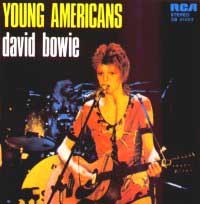
"Young Americans" is a song by the English singer-songwriter David Bowie from his ninth studio album of the same name. It was mostly recorded in August 1974 at Sigma Sound Studios in Philadelphia and was debuted on the Soul tour the following month. The song featured contributions from then-unknown singer Luther Vandross, who conceived the backing vocal arrangement. An embracement of R&B and Philadelphia soul, the song presents an Englishman's impressionist portrait of America at the time, featuring various characters and allusions to American totems and events.

"Let's Spend the Night Together" is a song written by Mick Jagger and Keith Richards, and originally released by the Rolling Stones as a double A-sided single together with "Ruby Tuesday" in January 1967. It also appears as the opening track on the American version of their album Between the Buttons. The song has been covered by various artists, including David Bowie in 1973.

"John, I'm Only Dancing" is a song by the English musician David Bowie, originally released as a non-album single on 1 September 1972. It is a glam rock and R&B song with lyrics that describe a situation in which the narrator informs his lover not to worry about the girl he is with because he is "only dancing" with her. Although ambiguous, many commentators interpreted it as concerning a gay relationship. Recorded in London in June 1972, it was promoted with a low-budget promotional video directed by Mick Rock. It reached number 12 in the UK; RCA refused to release it in America due to its suggestive lyrical content.

"Rock 'n' Roll Suicide" is a song by the English singer-songwriter David Bowie, originally released as the closing track on the album The Rise and Fall of Ziggy Stardust and the Spiders from Mars on 16 June 1972. Co-produced by Ken Scott, Bowie recorded it with his backing band the Spiders from Mars – comprising Mick Ronson, Trevor Bolder and Mick Woodmansey. It detailed Ziggy's final collapse like an old, washed-up rock star and, as such, was also the closing number of the Ziggy Stardust live show. In April 1974 RCA issued it as a single.

"Scary Monsters (and Super Creeps)" is a song by the English singer-songwriter David Bowie, released as the title track of his 1980 album Scary Monsters (and Super Creeps). It was also issued as the third single from that album in January 1981. Coming as it did in the wake of two earlier singles from Scary Monsters, "Ashes to Ashes" in August 1980 and "Fashion" in October the same year, NME critics Roy Carr and Charles Shaar Murray labelled its release another instance "in the fine old tradition of milking albums for as much as they could possibly be worth". The song was subsequently performed on a number of Bowie tours.

"Cat People (Putting Out Fire)" is a song recorded by the English singer-songwriter David Bowie as the title track of the 1982 erotic horror film Cat People. Bowie became involved with the track after director Paul Schrader reached out to him about collaborating. The song was recorded at Mountain Studios in Montreux, Switzerland in July 1981. Bowie wrote the lyrics, which reflected the film, while the Italian producer Giorgio Moroder composed the music.

"Let's Dance" is a song by the English singer-songwriter David Bowie, originally included as the title track of his 1983 album of the same name. Co-produced by Nile Rodgers of Chic, it was recorded in late 1982 at the Power Station in New York City. With the assistance of engineer Bob Clearmountain, Rodgers transformed the song from its folk rock origins to a dance number through studio effects and new musicians Bowie had yet to work with. Bowie hired then-unknown Texas guitarist Stevie Ray Vaughan, who added a blues-edge.
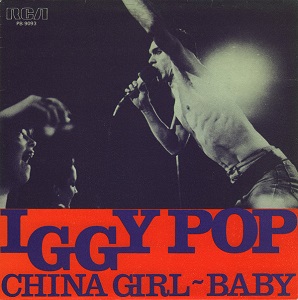
"China Girl" is a song written by Iggy Pop and David Bowie in 1976, and first released by Pop on his debut solo album, The Idiot (1977). Inspired by an affair Pop had with a Vietnamese woman, the lyrics tell a story of unrequited love for the protagonist's Asian girlfriend, realizing by the end that his Western influences are corrupting her. Like the rest of The Idiot, Bowie wrote the music and Pop improvised the lyrics while standing at the microphone. The song was released as a single in May 1977 and failed to chart.
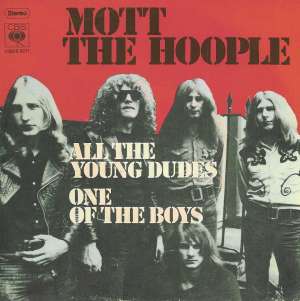
"All the Young Dudes" is a song written by English singer-songwriter David Bowie, originally recorded and released as a single by the English rock band Mott the Hoople in 1972 by Columbia Records. Bowie produced the song, which he had given to the band after they rejected his "Suffragette City". Bowie would subsequently record the song himself. Regarded as an anthem of glam rock, the song has received acclaim and was a commercial success. In 2021, Rolling Stone ranked "All the Young Dudes" number 166 in its list of the 500 Greatest Songs of All Time. It is also one of the Rock and Roll Hall of Fame's 500 Songs that Shaped Rock and Roll.

"Amsterdam" is a song by Jacques Brel. It combines a powerful melancholic crescendo with a rich poetic account of the exploits of sailors on shore leave in Amsterdam. Musically, it takes its base melody line from the melody of the English folk song Greensleeves.

